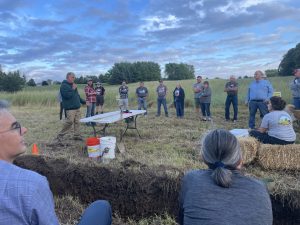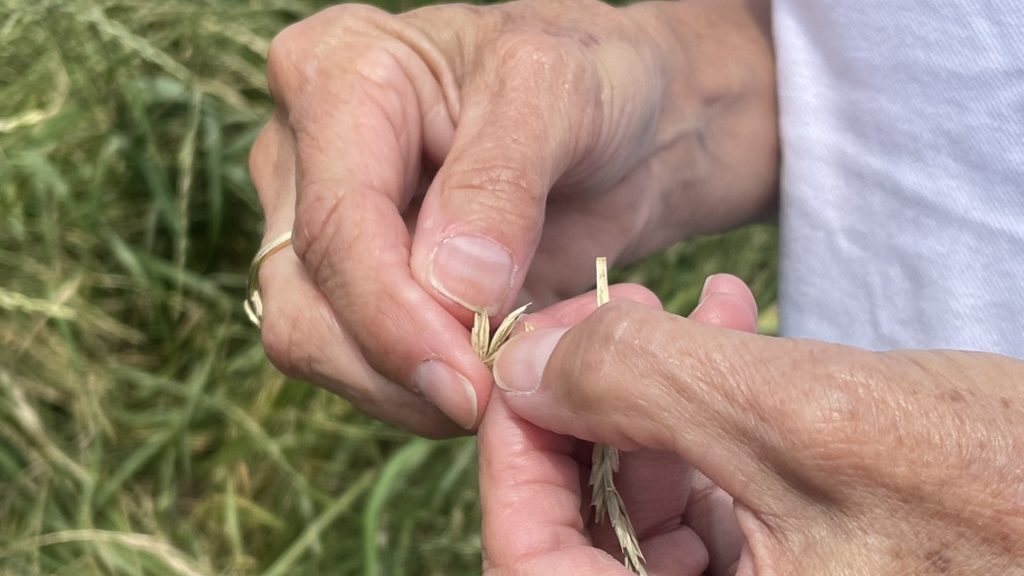Clean Wisconsin’s Natural Climate Solutions Initiative is leading the strategic effort to unify Wisconsin Kernza® stakeholders, address barriers to adoption of this dual-use perennial crop, tackle supply chain challenges, and improve direct market access to the grain in a collective effort to help scale Kernza® production in Wisconsin. As part of Wisconsin’s Natural Climate Solutions Roadmap to reach net-zero agricultural emissions by 2050, the WI-grown Kernza® Supply Chain Hub Pilot Project aims to establish sustainable pricing models, streamline local supply chains and boost local processing capacity.
Kernza® is a highly flavorful, nutrient-dense crop, used for both grain and forage. Its health benefits include high levels of protein, fiber, calcium, and antioxidants, low glycemic levels, and lower gluten than conventional (annual) wheat. Its perennial nature also provides environmental benefits, such as reducing soil erosion, improving water quality, and sequestering carbon with its deep root systems. If grown at scale, Kernza® could play a key role in offsetting agricultural greenhouse gas emissions in Wisconsin, helping to achieve and potentially even surpass net-zero climate goals.

Despite its promise, Kernza® faces hurdles to widespread adoption, mainly due to high prices and low supply. Since 2019, Wisconsin Kernza® has struggled to find a consistent market. In 2023, one Milwaukee craft brewery sourced 2,000 lbs of Wisconsin-grown Kernza® for a test run of five beers. This Wisconsin-grown Kernza® ultimately travelled over 1,000 miles (to be cleaned in North Dakota, aggregated in Minnesota, and transported back to Milwaukee) just to end up 30-45 min away from its fields of origin. At $7.50 per pound, the grain was significantly more expensive than traditional brewing grains like malted barley, priced at $0.34 per pound. On top of transportation and processing costs, the added transportation emissions negated the climate benefits of the crop, while also reducing profit margins for both growers and end-users alike. This is not a sustainable business model.
To overcome these barriers, Wisconsin’s leading Kernza® advocates — Clean Wisconsin, Michael Fields Agricultural Institute, UW-Madison, UW Extension, and Rooster Milling—have come together in collaboration with The Land Institute, University of Minnesota’s Forever Green Initiative, and Arcola Farms, to make the first concerted effort to address the challenges of commercialization of Kernza® in Wisconsin and to align stakeholders across the supply chain. In January 2024, the project secured equipment for a miller in southeastern Wisconsin, making it only the second commercial-scale processor in the state.
The WI Kernza® Supply Chain Hub connects farmers, processors, and buyers to streamline operations to identify major challenges they face and to coordinate activities aimed at overcoming these obstacles. So far, ten existing farmers and five research stations— covering 96 acres across 12 counties in Wisconsin— have been invited to participate in the project, and new growers have joined to plant additional acreage for harvest in 2025.
In addition to improving infrastructure, the project has presented at field days and brewer events to raise awareness of Kernza®’s environmental and culinary benefits. By the end of August, 4,000 lbs of Kernza® had been harvested and prepared for processing, enough to produce 100-300 barrels of beer. By 2025, yields are expected to quadruple as first-year fields mature and new growers join the effort. A robust supply chain is critical to meeting this growing demand and ensuring consistent quality and supply to breweries, bakeries, and restaurants.
Looking ahead, the WI Kernza® Supply Chain Hub will facilitate roundtable discussions with farmers, processors, and buyers to address pricing challenges and work together to identify the best farm-gate price range that provides fair returns for farmers while being viable for buyers. By working collaboratively, Wisconsin can lead the way in scaling Kernza® and demonstrating how natural climate solutions can benefit both rural economies and the environment.
This work is made possible thanks to the generous support of The Daybreak Fund.

